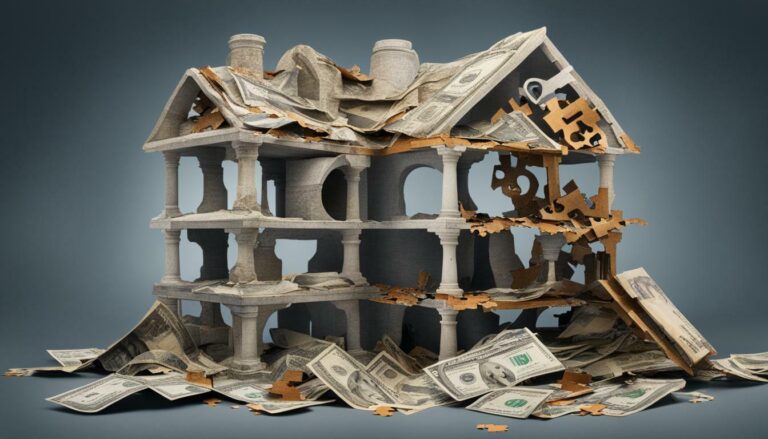Unlock Success with Steps to Effective Credit Repair

Taking charge of your financial future begins with understanding the steps to effective credit repair. Whether you’re looking to improve your credit score, fix errors on your credit report, or rebuild your credit history, a strategic approach is essential. With the right knowledge and tools, you can navigate the credit repair process and unlock financial success.
During the credit repair process, it is crucial to review your credit reports from major bureaus, such as Equifax, Experian, and TransUnion. Identifying potential mistakes and disputing them with the bureau can have a significant impact on your credit score. While you can undertake credit repair individually, professional credit repair services can provide expert guidance, handle disputes, and offer valuable advice on credit improvement.
It’s important to set realistic expectations when it comes to credit repair. While it can improve your credit score, it cannot guarantee a perfect score. Understanding this will help you stay focused and motivated throughout the process. Building and maintaining a strong credit score is a key factor in achieving financial success. It opens up opportunities for competitive loan rates, credit approvals, and favorable terms in financial negotiations.
Being aware of potential pitfalls that can negatively impact your credit score is crucial. Late or missed payments can significantly dent your credit health. By paying your bills on time, limiting new credit applications, and regularly reviewing your credit reports for discrepancies, you can maintain a stellar credit score.
Debunking credit repair myths and misconceptions is essential for understanding how to effectively repair credit. By separating fact from fiction, you can make informed decisions and take the necessary steps to improve your credit health.
🚨 TUIC Errors + Low Credit Score?
CreditScoreIQ helps you build credit faster by reporting utility bills to all 3 bureaus—while you dispute errors.
Start Building Credit Today →- Understanding the credit repair process is crucial for improving your credit health.
- Review your credit reports from major bureaus and dispute any errors you find.
- Consider enlisting the help of professional credit repair services for expert guidance.
- Set realistic expectations and understand that credit repair cannot guarantee a perfect score.
- Building and maintaining a strong credit score opens up financial opportunities.
Understanding the Credit Repair Process
The credit repair process is a crucial step towards improving your credit score and rebuilding your financial health. It involves reviewing your credit reports from major bureaus, such as Equifax, Experian, and TransUnion, to identify any errors or discrepancies. These errors can have a significant impact on your credit score, so it’s important to thoroughly review your reports and dispute any inaccuracies.
Once you’ve identified the errors in your credit reports, you can initiate the credit restoration process. This involves contacting the credit bureaus and providing them with documentation to support your disputes. The bureaus will then investigate the disputed items and make any necessary corrections or deletions. It’s important to note that this process can be time-consuming and may require ongoing communication with the bureaus.
In addition to disputing errors on your credit reports, repairing your credit also involves taking proactive steps to improve your credit health. This includes making consistent, on-time payments on your existing accounts, paying down debt, and refraining from opening new credit accounts unless necessary. These actions can help demonstrate responsible credit behavior and positively impact your credit score over time.
| Key Steps in the Credit Repair Process | Benefits of Credit Restoration |
|---|---|
|
|
“Repairing your credit takes time and effort, but it is a worthwhile investment in your financial future.” – Credit Repair Expert
It’s important to be patient throughout the credit repair process and have realistic expectations. While credit repair can improve your credit score, it cannot guarantee a perfect score. The duration of the process varies depending on the complexity of the errors and the responsiveness of the credit bureaus. However, with perseverance and a commitment to responsible credit habits, you can rebuild your credit and achieve a healthier financial standing.

Understanding the credit repair process is vital for anyone looking to improve their credit score and financial well-being. By reviewing credit reports, disputing inaccuracies, and taking proactive steps to improve credit health, individuals can successfully repair their credit. Patience, realistic expectations, and a commitment to responsible credit habits are key to achieving long-term credit repair success.
Enlisting Professional Credit Repair Services
When it comes to fixing bad credit, many individuals turn to professional credit repair services for their expertise and guidance. These services offer a range of benefits that can significantly improve credit health and ultimately lead to financial success. By enlisting professional help, you can navigate the complexities of the credit repair process more effectively and maximize your chances of achieving your credit goals.
One of the key advantages of credit repair services is their in-depth knowledge and understanding of the credit industry. They have experience in dealing with credit bureaus and creditors, which allows them to effectively communicate on your behalf. Their expertise in handling disputes and negotiating with creditors can help to remove inaccurate or outdated information from your credit report, leading to an improvement in your credit score.
Furthermore, credit repair services provide personalized guidance tailored to your specific credit situation. They can offer valuable advice on credit improvement strategies, such as establishing positive credit history, managing debt effectively, and avoiding common credit pitfalls. By following their recommendations, you can make informed decisions and take proactive steps towards rebuilding your credit profile.
| Credit Repair Services Benefits: |
|---|
| Expert knowledge of the credit industry |
| Effective communication with credit bureaus and creditors |
| Removal of inaccurate or outdated information from credit reports |
| Personalized guidance on credit improvement strategies |
| Proactive steps towards rebuilding credit profile |
“By enlisting professional credit repair services, you can navigate the complexities of the credit repair process more effectively and maximize your chances of achieving your credit goals.”
It is important to note that credit repair services are not a quick fix solution and cannot guarantee a perfect credit score. The duration of the credit repair process can vary depending on the complexity of the errors on your credit report. However, with their expertise and guidance, you can set realistic expectations and work towards steady credit improvement over time.
In conclusion, enlisting professional credit repair services can be a valuable investment in your financial future. Their knowledge, experience, and personalized guidance can help you navigate the credit repair process more effectively and increase your chances of achieving a stronger credit score. By taking proactive steps and following their recommendations, you can unlock the doors to financial success and enjoy the benefits of improved credit health.

Improving your credit score requires setting realistic expectations and implementing effective credit repair strategies. While credit repair can help improve your credit health, it is important to understand that it cannot guarantee a perfect score. It is crucial to have a clear understanding of what credit repair can and cannot accomplish.
One common misconception is that credit repair can magically remove all negative information from your credit report. While errors and inaccuracies can be disputed and potentially removed, legitimate negative information such as late payments, bankruptcies, or foreclosures will remain on your credit report for a certain period of time as determined by credit reporting laws.
Another important aspect to consider is the duration of the credit repair process. It takes time to review your credit reports, identify errors, and dispute them with the credit bureaus. The complexity of your case and the responsiveness of the credit bureaus and creditors can also impact how long the process takes. Patience and persistence are key when it comes to credit repair.
To set realistic expectations, it is recommended to consult with a professional credit repair service or credit counseling agency. These organizations have the expertise to guide you through the credit repair process, provide personalized advice, and help you develop a plan to improve your credit score. They can also offer valuable credit repair tips and strategies tailored to your specific situation.

- Improving your credit score requires setting realistic expectations and implementing effective credit repair strategies.
- Credit repair cannot guarantee a perfect score or remove legitimate negative information.
- The credit repair process takes time and requires patience.
- Consulting with a professional credit repair service or credit counseling agency can provide personalized guidance and advice.
Table – Common Credit Repair Myths:
| Myth | Reality |
|---|---|
| “Credit repair companies can remove all negative information from my credit report.” | Credit repair can only remove errors or inaccuracies, not legitimate negative information. |
| “Credit repair can guarantee a perfect credit score.” | Credit repair can help improve your credit score, but it cannot guarantee a specific score. |
| “Credit repair is an overnight process.” | Credit repair takes time and requires ongoing effort to see results. |
| “I can’t repair my credit on my own; I need to hire a professional.” | While professional credit repair services can provide expertise and assistance, credit repair can also be done individually with the right knowledge and resources. |
Building and Maintaining a Strong Credit Score
Building and maintaining a strong credit score is vital for financial success and opens doors to favorable loan rates and credit approvals. A good credit score is an indicator of responsible financial behavior, which lenders and creditors consider when assessing an individual’s creditworthiness. To improve your credit score and establish a solid credit foundation, there are several key strategies to keep in mind.
Rebuilding Credit History
If you have a poor credit history or no credit history at all, rebuilding your credit is crucial. One effective way to do this is by obtaining a secured credit card. These cards require a cash deposit as collateral, which lowers the risk for the credit issuer. By using the secured card responsibly and making timely payments, you can demonstrate your creditworthiness over time. Additionally, it is important to minimize new credit applications as each application can temporarily lower your credit score.
Another strategy to rebuild credit history is to become an authorized user on someone else’s credit card. This allows you to piggyback on their positive credit history and benefit from their responsible payment behavior, helping to improve your own credit score.
Paying Bills on Time
Payment history is a significant factor in calculating your credit score. To maintain a strong credit score, it is essential to pay all your bills, including credit card bills, loans, and utilities, on time. Late or missed payments can have a negative impact on your credit score and may stay on your credit report for up to seven years. Setting up automatic payments or reminders can help ensure timely payments and protect your creditworthiness.
Regularly Reviewing Credit Reports
Regularly reviewing your credit reports is essential for identifying and addressing any errors or discrepancies that may be negatively impacting your credit score. You can obtain a free copy of your credit report from each of the major credit bureaus once a year. Review the reports carefully and report any inaccuracies or outdated information to the respective credit bureaus. By keeping a close eye on your credit reports, you can maintain an accurate and up-to-date credit history.
| Key Strategies for Building and Maintaining a Strong Credit Score |
|---|
| Rebuild credit history by obtaining a secured credit card and becoming an authorized user on someone else’s credit card. |
| Pay all bills, including credit card bills and loans, on time to maintain a positive payment history. |
| Regularly review credit reports to identify and dispute any errors or discrepancies. |
By following these strategies and maintaining good financial habits, you can gradually improve your credit score and pave the way for a healthier financial future. Remember, building and maintaining a strong credit score is a long-term process that requires patience and discipline. With consistent effort, you can unlock the benefits of a good credit score, such as favorable loan rates, increased credit approvals, and more financial opportunities.

Avoiding common pitfalls is crucial when working towards fixing bad credit and repairing your credit report. These pitfalls can have a significant negative impact on your credit score and hinder your progress in achieving financial stability. To ensure a successful credit repair journey, it is important to be aware of these pitfalls and take proactive measures to avoid them.
1. Making late or missed payments
One of the quickest ways to damage your credit score is by consistently making late payments or missing them altogether. Payment history accounts for a significant portion of your credit score, so it is essential to pay your bills on time. Set reminders, automate payments, or create a budget to ensure that you meet your financial obligations promptly.
2. Taking on new credit without careful consideration
Opening new credit accounts may seem like a good idea for improving your credit, but it can actually backfire if not done thoughtfully. Applying for multiple credit cards or loans within a short period can lower your credit score, as it may indicate financial desperation or an inability to manage your finances responsibly. Be selective and apply for credit only when necessary and you can comfortably manage the payments.
3. Neglecting to review your credit reports regularly
Reviewing your credit reports regularly is an essential part of credit repair. It allows you to identify errors or discrepancies that may be impacting your credit score negatively. By thoroughly examining your credit reports from major bureaus like Equifax, Experian, and TransUnion, you can dispute any mistakes and ensure that your credit information is accurate. Take advantage of the free annual credit reports available to you to stay on top of your credit health.

While some individuals opt to repair their credit independently, seeking the assistance of credit repair professionals can often yield better results. These experts have the knowledge and experience to navigate the complex credit repair process, communicate effectively with creditors and bureaus, and provide tailored advice to improve your credit health. Avoid the misconception that credit repair services are unnecessary; they can be invaluable in helping you achieve your credit goals.
By avoiding these common pitfalls and adopting healthy financial habits, you can work towards fixing bad credit and repairing your credit report. Remember that credit repair takes time and patience, so stay committed to your long-term financial goals. With perseverance and the right strategies, you can improve your credit score and unlock a brighter financial future.
## H2: Debunking Credit Repair Myths and Misconceptions
Don’t be swayed by credit repair myths – understanding the truth is essential for effective credit repair. There is a lot of misinformation circulating about credit repair, which can lead individuals astray when trying to improve their credit health. It’s crucial to separate fact from fiction and arm yourself with accurate information to navigate the credit repair process successfully.
One common myth is that credit repair is illegal or unethical. The truth is that credit repair is a legitimate and legal process. It involves identifying errors on your credit reports and disputing them with the credit bureaus. While some companies may engage in fraudulent practices, it’s important to choose reputable credit repair services that adhere to the law and follow ethical guidelines.
“Credit repair is a legitimate and legal process.”
Another myth is that credit repair can magically erase all negative information from your credit reports. While credit repair can help remove inaccurate or outdated information, it cannot erase legitimate negative items such as late payments or bankruptcies. The aim of credit repair is to ensure that your credit reports are accurate and reflect your true creditworthiness.
It’s also important to debunk the misconception that credit repair is a quick fix. The credit repair process can take time, depending on the complexity of the errors on your credit reports. Patience and persistence are vital when working towards improving your credit score. Set realistic expectations and remember that credit repair is a journey, not an overnight solution.
Debunking Credit Repair Myths and Misconceptions
To summarize, credit repair is a legal and ethical process that involves identifying and disputing errors on your credit reports. It cannot remove legitimate negative information, and it takes time to see results. By understanding the truth about credit repair, you can make informed decisions and take effective steps towards improving your credit health.
| Myth | Truth |
|---|---|
| Credit repair is illegal | Credit repair is a legitimate and legal process. |
| Credit repair erases all negative information | Credit repair can only remove inaccurate or outdated information, not legitimate negative items. |
| Credit repair is a quick fix | Credit repair takes time and requires patience and persistence. |
Conclusion
By following the steps to effective credit repair and implementing the provided credit repair tips, you can improve your credit score and pave the way for a more secure financial future.
Credit repair is the process of fixing errors in credit reports, which can have a significant impact on your credit score. It is important to review credit reports from major bureaus, such as Equifax, Experian, and TransUnion, to identify potential mistakes and dispute them with the bureau. While credit repair can be done individually, many people choose to enlist the help of professional credit repair services. These companies have expertise in handling disputes, communicating with creditors, and providing advice to improve your credit health.
It is crucial to have realistic expectations and to understand that credit repair services cannot guarantee a perfect score. The duration of the credit repair process varies depending on the complexity of the errors. Building and maintaining a strong credit score is essential for financial success, as it opens up opportunities for competitive loan rates, credit approvals, and favorable terms in financial negotiations.
To ensure a healthy credit profile, it is important to be aware of potential pitfalls that can dent your credit score. Late or missed payments, for example, can have a negative impact. Additionally, debunking credit repair myths and misconceptions is important for understanding how to effectively repair your credit. Strategies to uphold a stellar credit score include paying bills on time, limiting new credit applications, and regularly reviewing your credit reports for discrepancies.
FAQ
What is credit repair?
Credit repair is the process of fixing errors in credit reports, which can have a significant impact on an individual’s credit score.
Why is it important to review credit reports?
Reviewing credit reports from major bureaus, such as Equifax, Experian, and TransUnion, is important to identify potential mistakes and dispute them with the bureau.
Should I enlist the help of professional credit repair services?
Many people choose to enlist the help of professional credit repair services for their expertise in handling disputes, communicating with creditors, and providing advice to improve credit health.
How long does the credit repair process take?
The duration of the credit repair process varies depending on the complexity of the errors.
Can credit repair services guarantee a perfect credit score?
No, credit repair services cannot guarantee a perfect credit score, but they can help improve credit scores.
Why is a strong credit score important?
A strong credit score is essential for financial success as it opens up opportunities for competitive loan rates, credit approvals, and favorable terms in financial negotiations.
What are some pitfalls to avoid in credit repair?
Pitfalls to avoid include late or missed payments, which can negatively impact credit scores.
Are there any myths and misconceptions about credit repair?
Yes, there are several myths and misconceptions about credit repair that need to be debunked to understand effective credit repair strategies.
Ready to Improve Your Credit?
Disputing TUIC errors is step one. Step two? Boost your score by reporting utility payments with CreditScoreIQ.
Get Started Now (Only $1 Trial) →3-bureau reporting • $1M identity insurance • Dark web monitoring





